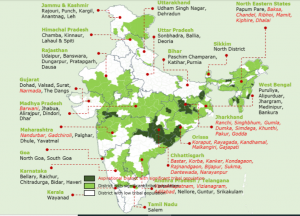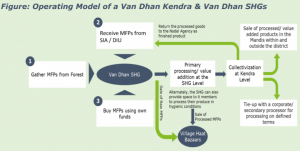The Tribal Cooperative Marketing Federation of India (TRIFED), under the Union government’s flagship scheme: ‘Pradhan Mantri Van Dhan Yojna’ (PMVDY), recently announced the introduction of a Mahua-based alcoholic “nutrabeverage” in the markets of the national capital. It is expected to be out for sale by the end of this year. Notably, this announcement has come at a crucial time when the flowering season of Mahua (March-June), a tree found in the jungles of Bastar, converges with the deadline of the Phase I of the aforementioned scheme on 31st March 2020. The ambitious initiative, under Shri Praveen Krishna, Managing Director of TRIFED, seeks to take the Minimum Support Price (MSP) programme for Minor Forest Produce (MFP) to the next level by facilitating MFP’s value addition by tribal gatherers in Bastar, which strikingly is also a Naxal-stronghold. Since the collection and sale of MFP closely touches the tribal lives in Bastar, the scheme is bound to impact the socio-economic conditions, security situations and power-equations in the region simultaneously.
Tribal Priority: Minor Forest Produce, Not Timber
Mahua, one of the listed MFPs from Bastar, plays an important part in the lives of Bastar’s tribals. It is not only consumed – with rice, chappatis and as a locally-brewed mild alcoholic drink, but also used for sale as a major Minor Forest Produce (MFP). While the State’s economic focus has been on timber produce from these forests since colonial-era explorations began, that the tribals prioritise MFP over timber produce (teak, sal, etc.) is a known fact. The tribals use the MFP for sustenance as well as a source of livelihood (as income when sold, as food when bartered, etc.). A total of over 50 listed MFPs hold the potential to employ over millions of tribals and generate sustainable income. While the Minimum Support Price for the listed MFP has been raised by 30-40 per cent lately, ensuring the adequate pricing in unregulated haat bazaars (where a majority of MFP is sold to traders) has been difficult, thus the benefits failing to reach its targeted beneficiaries. Generally, less than 20 per cent of the net sale price reaches the gatherers, with a majority of it spilled over a chain of middlemen traders. Owing to the lack of infrastructure, arbitrary pricing and unawareness of the gatherers, this potential has thus been inadequately harnessed so far. The lack of storage capacities have particularly hurt the gatherers in mahua’s context. While they sell the extra mahua flowers before monsoons for lack of storage, the same is bought back from the traders at double the price post-monsoon for consumption. Plus, due the economic benefits attached to timber, despite efforts to encourage MFP plantation post-Independence, the diversion forests for timber production has further added to the woes of the tribal gatherers.
Recognising the underutilised MFP potential, the Pradhan Mantri Van Dhan Yojna was launched by the Prime Minister in April 2018 in Bijapur. It aimed at initiating the ambitious raising of 6000 Van Dhan Kendras for facilitating value addition of MFP across the country’s 307 prominent tribal districts, over two years.
Tribal districts flagged under PMVDY
 Since a few gatherers tend to sell some of the MFP for immediate cash at local haat bazaars, regulation of these bazaars is expected to result in adequate pricing and demand for the processed goods.
Since a few gatherers tend to sell some of the MFP for immediate cash at local haat bazaars, regulation of these bazaars is expected to result in adequate pricing and demand for the processed goods.
PMVDY: Status so far:
Of these, over 2100 Kendras (70 per cent) were proposed to be converged with the Ajeevika Mission under the Ministry of Rural Development. These VDKs are to work with a group of approximately 15 Self-help groups (SHGs) where each SHG will be trained for primary value addition to the gathered MFP. These processed goods are to be sent up to the VDK for secondary value addition and further for the sale of final processed goods in the national market. Collaboration with private entrepreneurs through PPP model is proposed for a secondary level of value addition to the processed MFP.
 As of now, processed tamarind-mahua candies through TRIFED have been finalised for bulk supply to Air India. The proposed sale of bottled beverage under the brand name ‘Mahua’ is another major development in this direction. This has come as a result of a two-year intense research under Prof SN Naik, Centre for Rural Development, IIT-Delhi. It is proposed to be sold at a cost of approximately INR 700 for 750 ml in six fruit-based flavours. A Chhattisgarh-based Adivasi Bahuuddeshiya Cooperative Society, in collaboration with the National Research Development Corporation, is tasked with the mass production and marketing of the product prepared under TRIFED. Moreover, a Memorandum of Understanding between TRIFED and IIT Delhi has been signed to further the initiative by the possible usage of mahua syrup to make squashes and jams for the national market, and further for export.
As of now, processed tamarind-mahua candies through TRIFED have been finalised for bulk supply to Air India. The proposed sale of bottled beverage under the brand name ‘Mahua’ is another major development in this direction. This has come as a result of a two-year intense research under Prof SN Naik, Centre for Rural Development, IIT-Delhi. It is proposed to be sold at a cost of approximately INR 700 for 750 ml in six fruit-based flavours. A Chhattisgarh-based Adivasi Bahuuddeshiya Cooperative Society, in collaboration with the National Research Development Corporation, is tasked with the mass production and marketing of the product prepared under TRIFED. Moreover, a Memorandum of Understanding between TRIFED and IIT Delhi has been signed to further the initiative by the possible usage of mahua syrup to make squashes and jams for the national market, and further for export.
To ensure a sustainable model, plantations of MFPs are planned to be undertaken by the Gram Panchayats in collaboration with the Forest Department in the respective areas. Adequate checks-&-balances have been put in place owing the imminent challenges in terms of the geography, socio-poitico-economic situations and existing power equations in the region. Mandatory half-yearly performance audits for the upscaling of the Kendras is a well-thought testimony for the same. A major plus point is the engagement with various NGOs and private entities, as per requirements, for the mobilisation, expertise, as well as financial support. Maintenance of a database of all the targeted beneficiaries and their operations onto a single platform, which will be geotagged and have interfacing with digital payments is another example in the row. Interestingly, since a significant number of these tribal gatherers of MFP are women, this initiative could also potentially empower tribal women – financially and otherwise.
Brilliant Roadmap, Tough Challenges
It must be acknowledged that any development – in economic, social or political spheres – in Bastar impacts all the spheres collectively and simultaneously. The strength of the Maoists in the region till date rests with the vulnerable tribal population that still looks at the State with distrust. Although a sea change in the tribal lives and consequentially their communication with the government has come about over the years, owing to percolation of greater governance benefits, a lot still remains undone. Provided that this initiative impacts the economics in the region, thus empowering the tribal populace, a simultaneous impact on the other two spheres – social and political – are bound to happen. This is no hidden secret.
A major point of significance, therefore, rests in the successful implementation of this scheme. It must be noted that a majority of the centres (70 per cent) are proposed to be converged with the existing ones under the Ajeevika Mission. While on one hand, it saves a majority of the required base effort, it equally rests the onus of the efficiency and success of the initiative on pre-existing structures in pre-existing situations in the region in question. Plus, the proposed initiative of eradicating a chain of middlemen and ensuring the percolation of the aimed benefits to the tribal gatherers is bound to alter the pre-existing economic-power equations in the region – which will be a major test for the scheme’s success. The Naxal presence is only to be perceived as a further deterrent, which might raise needs for security guarantees to the VDKs. In time, if the initiative successfully reaches a majority of its targets, if not all, Bastar would experience its long-awaited transformation.
References:
- Pradhan Mantri VAN DHAN Yojana (Guidelines). [ebook] New Delhi: Ministry of Tibal Affairs, Government of India. Available at: <http://trifed.in/trifed/(S(eeqzxfq5a3wkls1xqe5n44a3))/pdf/Annexure_5_Guidelines_Revised-2019.pdf> [Accessed 27 March 2020].
- The Times of India, “Cheers to Adivasi way of life! Delhi to get desi beer from Mahua”, 10 March 2020, Available at: https://timesofindia.indiatimes.com/city/delhi/cheers-to-adivasi-way-of-life-delhi-government-set-to-launch-desi-beer-from-mahua/articleshow/74559505.cms. Accessed on 15 March 2020.
- Business Today, “Move over beer! Govt to bottle and sell traditional tribal drink Mahua from Bastar”, 27 July, 2018. Available at: https://www.businesstoday.in/current/economy-politics/move-over-beer-govt-bottle-sell-traditional-tribal-drink-mahua-from-bastar/story/280740.html. Accessed on 15 March, 2020.















